■ Upcoming activities
WORKSHOP — Granada, Spain. April 25, 2024
Workshop: «Humano Ex Machina: una conversación sobre IA». Centro Federico García Lorca. Granada, Spain, April 25, 2024. Free access.
What are the limits and opprotunities of AI in journalism? How should newswork be transformed to guarantee quality information? What are the main dangers and opportunities? An in-depth conversation on the ethical and professional challenges of artificial intelligence in journalism with Carlos A. Scolari, renowned researcher on the impacts of technology on information, moderated by Domingo Sánchez-Mesa.

■ Featured publications
RESEARCH ARTICLE — May 2024
Salaverría, R., & Martínez-Costa, M. P. (2024). Digital journalism in Spain: Technological, sociopolitical and economic factors as drivers of media evolution. Journalism, 25(5), Special Issue: Digital News Histories in Europe: 1050-1069. DOI:10.1177/14648849231170519
Abstract
Digital journalism has been a reality in Spain for nearly 30 years. In this time, the number of digital media outlets has steadily increased to become the most abundant type of media in the 2020s, ahead of print, radio and television. Based on a quantitative analysis of the authors’ own database of active digital media outlets (n = 2726) and an examination of Spain’s technological, sociopolitical and economic development in recent decades, this article identifies several factors that have spurred the evolution of digital journalism in Spain. The study results show a correlation in the period from 1994 to 2020 between the percentage of Internet users and the number of active digital media outlets, which showed very similar progress. The study also detects a relationship between the country’s economic evolution and the expansion of digital media, albeit with a seemingly paradoxical effect: digital media, especially digital native media companies, proliferated even more when the economy was at its worst. The article highlights the subtle effects of political factors on the development of digital media in the period under study, although increasing political polarization has triggered additional transformation processes in recent years.
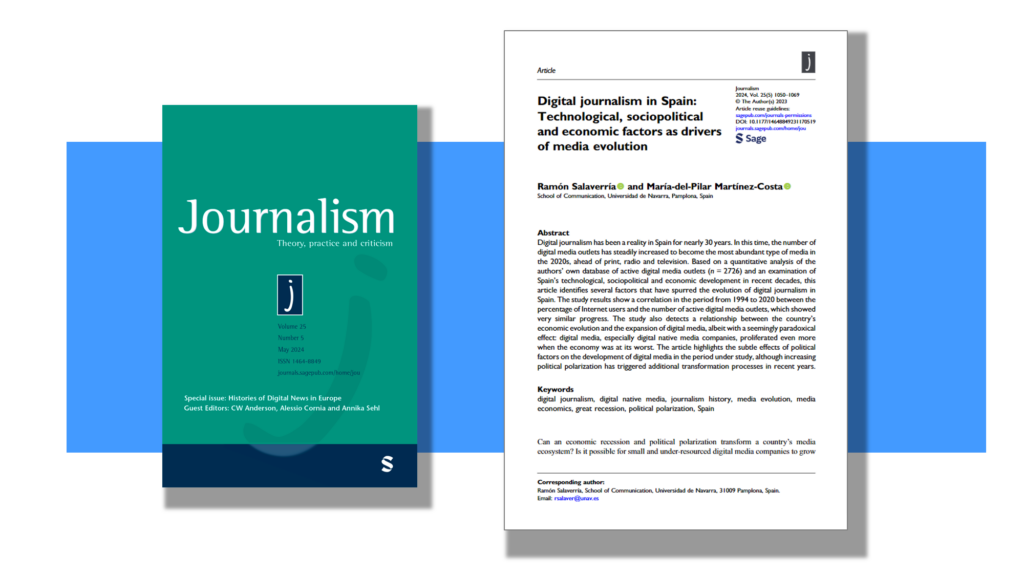
RESEARCH ARTICLE — October 2023
Salaverría, R., & Cardoso, G. (2023). Future of disinformation studies: emerging research fields. Profesional de la información, v. 32, n. 5, e320525. DOI:10.3145/epi.2023.sep.25
Abstract
This article examines research trends on disinformation. First, it explores the relationship between disinformation and digital news media, highlighting the negative impact of disinformation on citizens’ trust in the news. Recent research on disinformation is classified into several areas, including typological studies, research on fact-checking, disinformation on digital platforms, and studies on media literacy. Next, the article identifies several emerging fields for research, such as studies on disinformation narratives, information manipulation and international interference, artificial intelligence generated disinformation, cross-platform disinformation, and thematic and multidisciplinary studies. Based on this analysis, the article highlights the need to continue investigating and combatting disinformation, as it is a persistent and growing problem in democratic societies.
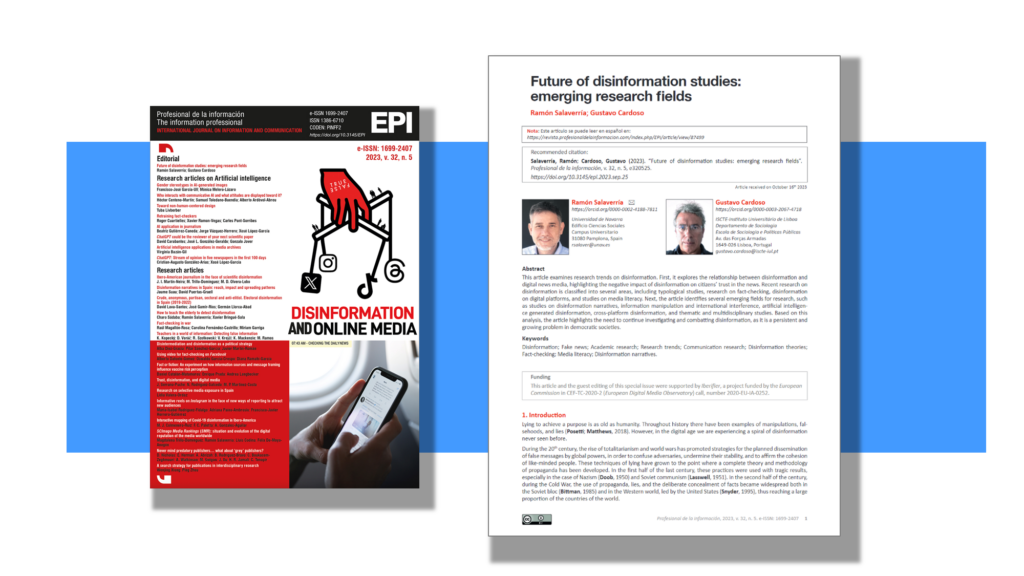
BOOK CHAPTER — March 2024
Garde-Eransus, E., & Salaverría, R. (2024). Patrones discursivos de la desinformación en España. In: J. Rúas Araújo, L. Alonso Muñoz & F. J. Paniagua Rojano (Eds.), El impacto de la desinformación en el ámbito local (pp. 111-127). Madrid: Fragua. ISBN: 9788412732535
Abstract
Una de las principales fuentes de bulos en España se encuentra en los llamados pseudomedios, sitios web de alcance tanto nacional como local que, bajo la apariencia de medios convencionales, propagan contenidos desinformativos ignorando los más elementales estándares profesionales del periodismo. A través de un análisis cuantitativo basado en la lingüística de corpus y un posterior estudio cualitativo apoyado en el análisis del discurso, este trabajo identifica las estrategias lingüísticas y discursivas que emplean los pseudomedios para denigrar a ciertos grupos sociales, tales como inmigrantes, colectivos feministas o ciertos grupos políticos. En concreto, el estudio detecta cinco estrategias: 1) la preferencia por el uso de estructuras adversativas, 2) la utilización intensiva de oposiciones léxicas, 3) el recurso a la ironía, 4) ciertas modalidades de empleo de los pronombres personales y posesivos, y 5) diversas formas de adjetivación peyorativa.
.
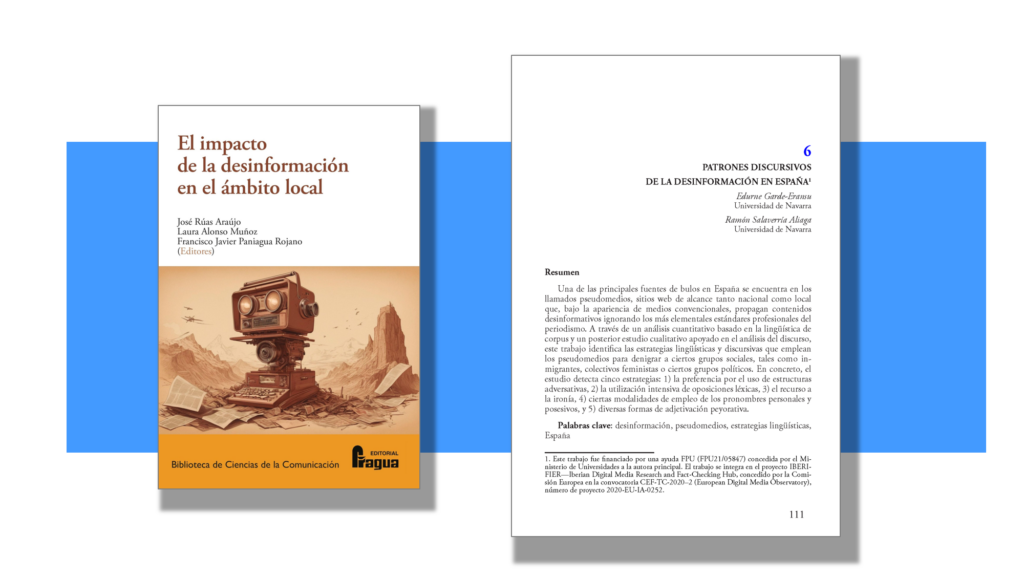
RESEARCH ARTICLE — March 2024
Trillo-Domínguez, M., Salaverría, R., Codina, L. & De-Moya-Anegón, F. (2024). Digital reputation indicator: a webometric approach for a global ranking of digital media. Journalism. Online First. DOI:10.1177/14648849241237647
Abstract
In this article we present the Digital Reputation Indicator (DRI), an innovative methodological tool that allows evaluating and comparing the reputation of digital news media on a global scale. In use since January 2023 by SCImago Media Rankings (scimagomedia.com), DRI is a composite assessment and measurement instrument that weighs web metrics originating from trusted, stable, and globally accessible sources. DRI provides a resource for the qualitative comparison of digital media according to a webometric model based on its level of citation by other websites (citationflow), the quality of the sites that link to the media (trustflow) and the level of authority scores associated with their domain (domain rating and authority score). This article explores the reliability of this webometric approach, which overcomes the limitations of the two media measurement paradigms used up to now: the most traditional, based on audience measurement, and the most recent, oriented towards popularity in social networks. In this article we present and test the consistency of the DRI as a resource for the building of a global ranking of digital media, an instrument that we consider to be of interest to both the academic and professional communities.
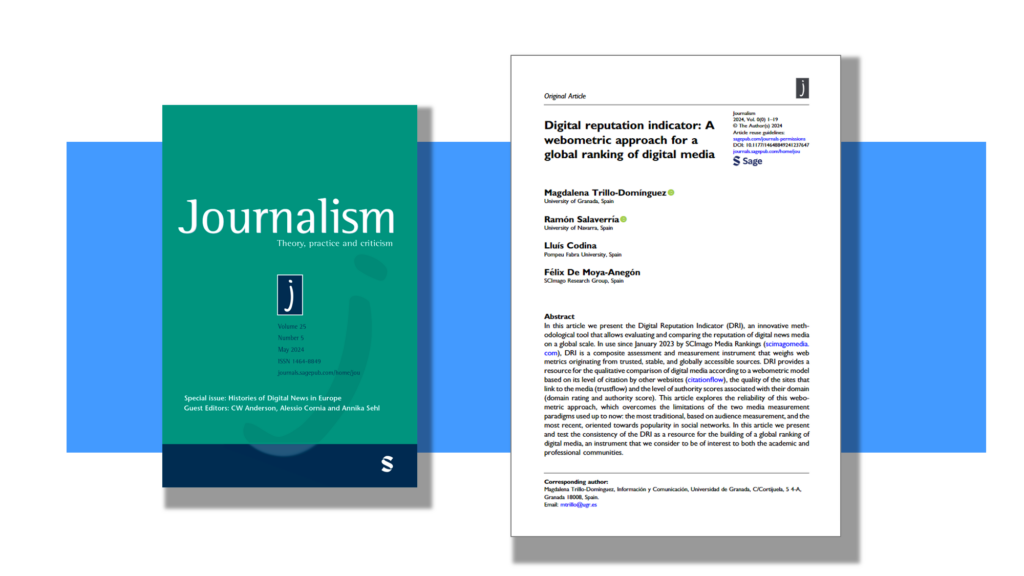
ENCYCLOPEDIA ARTICLE — 2019
Salaverría, R. (2019). Digital journalism. In: Vos, T. P., & Hanusch, F. (Eds.) The International Encyclopedia of Journalism Studies (pp. 453-463). Hoboken, NJ: Wiley-Blackwell. DOI:10.1002/9781118841570.iejs0189 ISBN:9781118841679
Abstract
Since the 1990s, digital journalism as a form of journalism that researches, produces, and publishes news solely with digital technologies has expanded rapidly. In addition to defining this model of journalism, this entry explains the global dimension that digital journalism has reached, as well as its history, typology of media, storytelling formats, ethical aspects, and future economic and technological challenges.
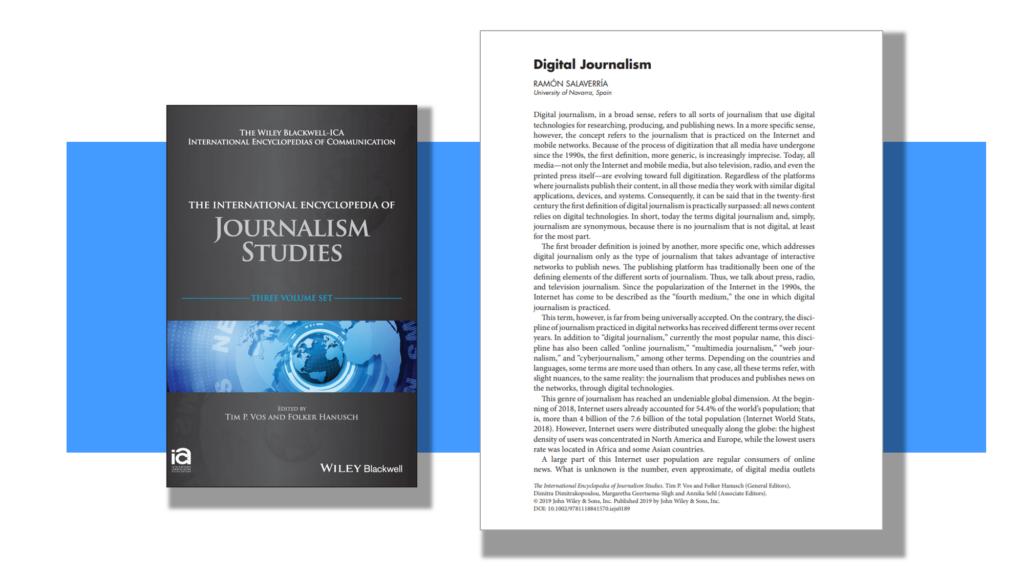
■ Books
Single-authored books, co-edited monographs and conference proceedings edited by Ramón Salaverría.






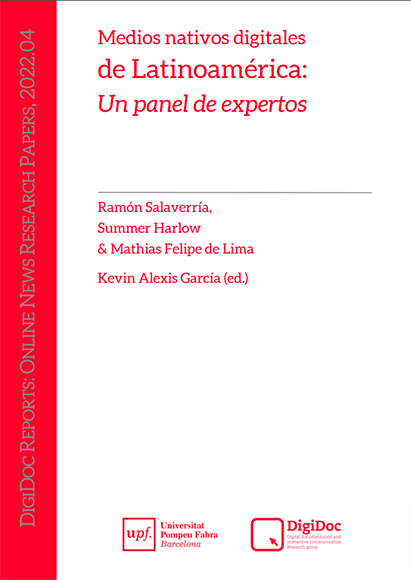

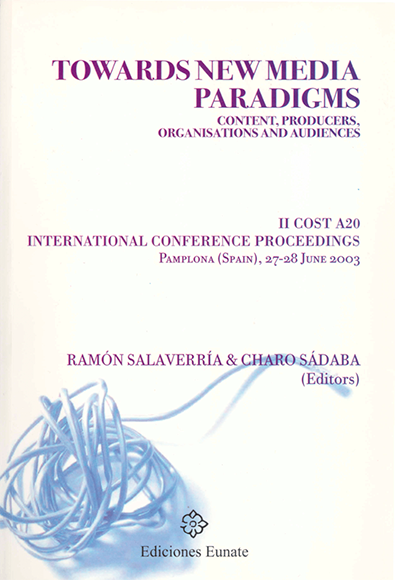
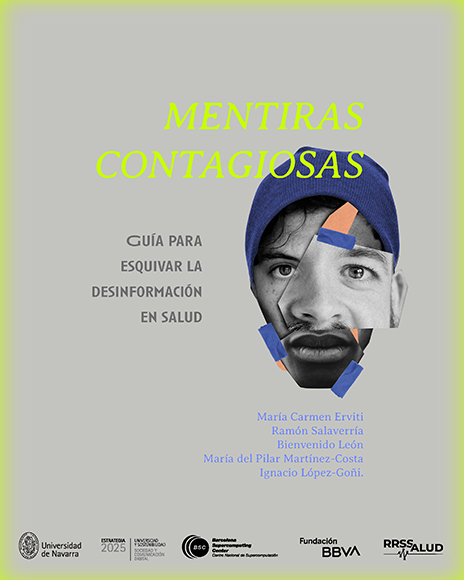

■ Media & interviews
Iberifier, el observatorio de los bulos, Parlamento, RTVE.es, February 17, 2024. (From 12:43)
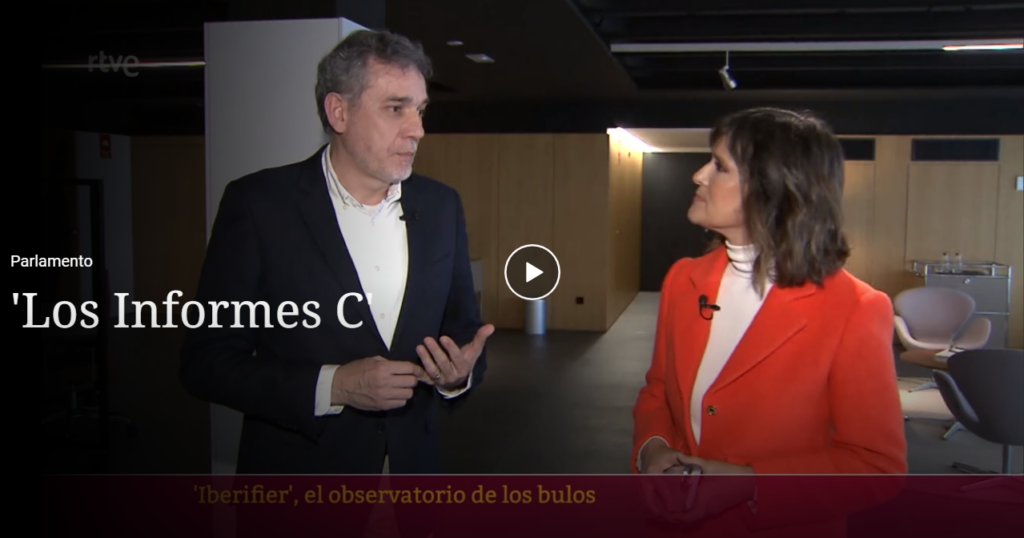
More:
■ Quotes
X post, August 25, 2014.
El periodismo es como el café: hay que servirlo rápido, endulzarlo lo justo y no estropearlo con mala leche.
■ Author
Ramón Salaverría
Full Professor of Journalism in the School of Communication at University of Navarra. My research focuses on digital journalism and disinformation.
Author of over 300 scholarly publications, I am listed in the Stanford University Ranking of the World’s most cited researchers. Award-winner of the ‘Researcher of the Year’ prize at the Roblon Awards, which recognizes excellence on media and communication research in Spanish-speaking countries.
With a long career as a leader of national and international research projects, I am currently the principal investigator of IBERIFIER – Iberian Digital Media Observatory, funded by the European Commission. I chaired the Journalism Studies Section of ECREA (European Communication Research and Education Association), as well as the Committee of Experts on Increasing Resilience of Media (MSI-RES) at the Council of Europe.
I have served as visiting researcher at the University of Texas at Austin (USA), as well as a guest professor at a dozen universities in Europe and the Americas. I have delivered keynotes, workshops and training programs in more than 30 countries.
Full bio & publications: web | pdf
